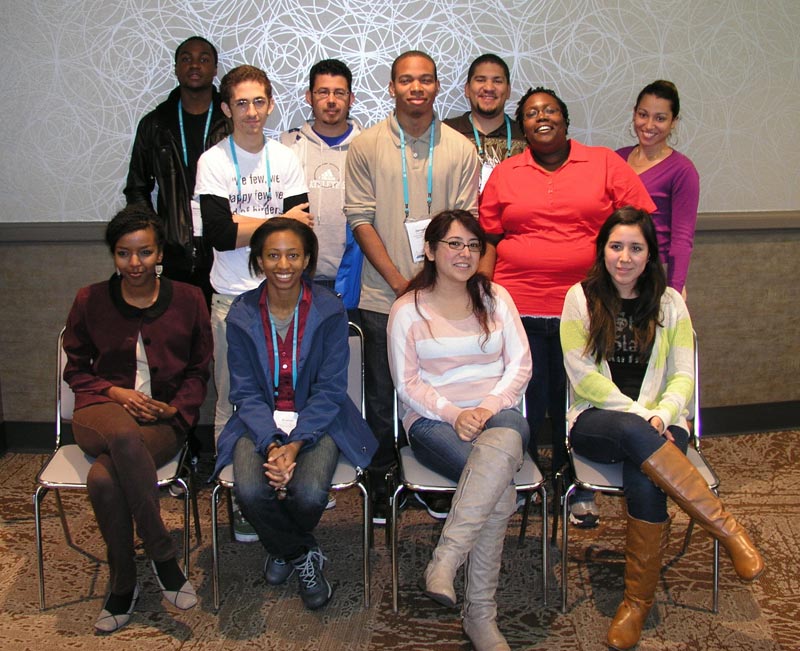- Wetland Championsswsmac Student Group Assessment
- Wetland Championsswsmac Student Group Member
- Wetland Championsswsmac Student Group Activities
Related Documents
About Wetland Program Development Grants (WPDGs)
A wetland is a distinct ecosystem that is flooded by water, either permanently or seasonally, where oxygen-free processes prevail. The primary factor that distinguishes wetlands from other land forms or water bodies is the characteristic vegetation of aquatic plants, adapted to the unique hydric soil.
WPDGs provide eligible applicants an opportunity to conduct projects that promote the coordination and acceleration of research, investigations, experiments, training, demonstrations, surveys and studies relating to the causes, effects, extent, prevention, reduction and elimination of water pollution.
Requests for Proposals (RFPs) are typically put out in the spring time.
WPDGs assist state, tribal, local government (S/T/LG) agencies and interstate/intertribal entities in building programs to protect, manage and restore wetlands. States, tribes, local governments, interstate associations, and intertribal consortia are eligible to apply for the Regional WPDG Request for Proposals (RFPs). Nonprofits, interstate associations and intertribal consortia are eligible to apply for the National WPDG RFPs.
WPDGs provide applicants an opportunity to develop and refine comprehensive state/tribal/local government wetland programs. These programs are meant to:
- Build the capacity of state/tribal/local governments to increase the quantity and quality of wetlands in the U.S. by conserving and restoring wetland acreage and improving wetland condition.
- Use one or more of the following “Core Elements” in order to achieve this goal.
- The science behind the implementation of these conservation practices and management strategies is developed and supported by the NRCS Science and Technology Divisions, National Technical Support Centers, the Water and Climate Center, and the Wetlands Team, who are continually developing new tools to, among other things, improve snowmelt.
- Marinus Otte and Dr. Donna Jacob brought the Wet Ecosystem research Group to the Department of Biological Sciences in the Fall of 2006. Prior to that the research group, then known as the Wetland Ecology Research Group, had been going strong at University College Dublin, Ireland (1992-2006).
- Maddie Miller, a University of Minnesota third-year individualized studies major, started the Students Against Pipelines student group last year and interned with nonprofit MN350 to do pipeline.
Core Elements
With the work of many states and tribes, the EPA has distilled a set of core elements, actions and activities that together comprise a comprehensive wetland program. The EPA has summarized these common core elements, actions and activities in Core Elements of an Effective State and Tribal Wetland Program, also called the 'Core Elements Framework.' The CEF describes in greater detail each of the four core elements that make up an effective state/tribal wetland program. These four core elements are:
- Monitoring and assessment.
- Voluntary restoration and protection.
- Regulatory approaches including CWA 401 certification.
- Wetland-specific water quality standards.

Past Grant Awards
The Wetland Grants Database contains further information on Wetland Program Development Grants that were awarded in past years. The Wetland Grant Database (WGD) houses grant data for Wetland Program Development Grants, a three-year demonstration pilot program (the 'Pilot Grants'), grant Case Study narratives and Model Products created by the grant program.
Applicants for Wetland Program Development Grants should examine the case studies and previous awards found in the Wetlands Grant Database and consider whether there is any information from any grants similar to their current proposals that the applicant can benefit from (such as project design, deliverables, etc.).
Headquarters Program Contact
Myra Price (price.myra@epa.gov)
EPA Wetlands Division
1200 Pennsylvania Avenue, NW, MC 4502T
Washington, DC 20460
Phone: 202-566-1225
FY2020 - FY 2021 National Wetland Program Development Grant — Application Period Closed.
FY2020 Five Star Restoration Training Grant — Application Period Closed.
Wetlands Grant Coordinators and Requests for Proposals

Tribal Wetland Program Development Grant Competition
Wetland Championsswsmac Student Group Assessment
Myra Price (price.myra@epa.gov)
1200 Pennsylvania Ave, NW
MC: 4501T
Washington, DC 20460
Phone: 202-566-1225
2020-2021 Tribal WPDG Request for Proposal — Application Period Closed.
Region 1 (CT, ME, MA, NH, RI, VT)
Donna Smith-Williams (smith.donna@epa.gov)
EPA Region 1
1 Congress Street, MC CSP, Suite 100
Boston, MA 02114
Phone: 617-918-1620
2019-20 WPDG Request for Applications — Application Period Closed.
Region 2 (NJ, NY, PR, VI)
Jaclyn Woollard (woollard.jaclyn@epa.gov)
EPA Region 2
290 Broadway
NY, NY 10007
Phone: 212-637-3832
2019-20 WPDG Request for Applications — Application Period Closed.
Region 3 (DE, MD, PA, VA, WV, DC)
Danielle Algazi (algazi.danielle@epa.gov)
EPA Region 3
Wetland Branch/Water Division
1650 Arch Street, MC 3WD10
Philadelphia, PA 19103
Phone: 215-814-2722
2020 WPDG Region 3 Request for Application — Application Period Closed.
Region 4 (AL, FL, GA, KY, MS, NC, SC, TN)
Geryl Ricks (ricks.geryl@epa.gov)
EPA Region 4
61 Forsyth Street, SW
Atlanta, GA 30303
Phone: 404-562-9837
2019-20 WPDG Request for Application — Application Period Closed.
Region 5 (IL, IN, MI, MN, OH, WI)
Dertera Collins (collins.dertera@epa.gov)
EPA Region 5
77 West Jackson Blvd., MC WW16J
Chicago, IL 60604
Phone: 312-353-6291
2019-20 WPDG Request for Applications — Application Period Closed.
Region 6 (AR, LA, NM, OK, TX)
Sondra McDonald (mcdonald.sondra@epa.gov)
EPA Region 6
1445 Ross Avenue, MC 6WQ-AT
Dallas, TX 75202
Phone: 214-665-7187


2019-20 WPDG Request for Applications — Application Period Closed.
Region 7 (IA, KS, MO, NE)
Jennifer Ousley (ousley.jennifer@epa.gov)
EPA Region 7
11201 Renner Boulevard
Lenexa, KS 66219
Phone: 913-551-7498
2019-20 WPDG Request for Applications — Application Period Closed.
Region 8 (CO, MT, ND, SD, UT, WY)
Cynthia Gonzales (gonzales.cynthia@epa.gov)
EPA Region 8
1595 Wynkoop Street
Denver, CO 80202
Phone: 303-312-6569
2020, 2021, and 2022 Region 8 WPDG Request for Applications — Application Period Closed.
Region 9 (AZ, CA, HI, NV, AS, GU)
Sarvy Mahdavi (mahdavi.sarvy@epa.gov)
EPA Region 9
Southern California Field Office
Los Angeles, CA 90017
Phone: 213-244-1830
Successful applicants for WPDGs in Region 9
2019-20 WPDG Request for Applications — Application Period Closed.
Region 10 (AK, ID, OR, WA)
Wetland grant coordinators in Region 10
Successful applicants for WPDGs in Region 10
2019-20 WPDG Request for Applications — Application Period Closed.
Wetland Championsswsmac Student Group Member
Welcome to the Wet Ecosystem Research Group (WERG)
Dr. Marinus Otte | Dr. Donna Jacob |
Wetland Championsswsmac Student Group Activities
Dr. Marinus Otte and Dr. Donna Jacob brought the Wet Ecosystem research Group to the Department of Biological Sciences in the Fall of 2006. Prior to that the research group, then known as the Wetland Ecology Research Group, had been going strong at University College Dublin, Ireland (1992-2006). Dr. Jacob joined the private sector to work as an environmental scientist with Houston Engineering in Fargo in 2014. The group is about anything and everything to do with wetlands and the research covers a wide range of scales from microscopic (e.g. biogeochemical processes in the rhizosphere) to landscape (e.g. chemical and ecological connectivity between prairie potholes across North Dakota). Regardless of the scale, the central theme is biogeochemistry and the interactions between multiple elements, water, soils and plants in wet environments. The group works to collaborate with a variety of researchers, including soil scientists, geologists, environmental engineers, microbiologists, as well as with groups underpinning management of natural resources, such as the North Dakota Department of Health, Environmental Health Section. Currently, WERG has EPA-funded projects about hydrological and chemical connectivity between Prairie Pothole Region (PPR) wetlands in North Dakota and about ecosystem services of restored PPR wetlands as a function of restoration age. Dr. Marinus Otte is further the Editor-in-Chief of the journal WETLANDS. |